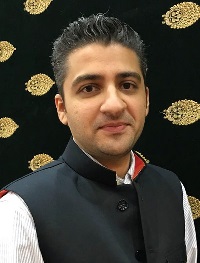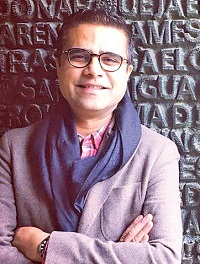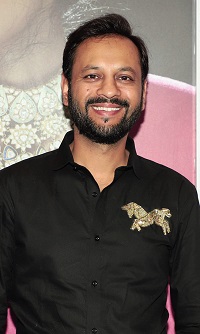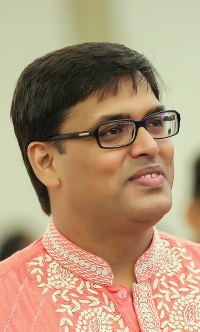Young Gems of Jaipur

Seven young jewellery entrepreneurs from Jaipur’s acclaimed jewellery brands talk about the legacy their forefathers have left behind and how they are carrying their heritage and brand name forward with Vijetha Rangabashyam and Sanjana Parikh
India is the youngest country today. Jaipur, a city steeped in culture and heritage is awash with history, of palaces, arts and crafts that flourished because of its people’s penchant and love for beauty. Make no mistake though, Jaipur, a historic city known for its royal appeal, is also filled with young city slickers who believe in blending the old and the new. These young jewellers whose brands are custodians of fine craftsmanship and whose forefathers were jewellers to the royal families back in the day, are carrying forward their family names with their burning thirst for entrepreneurship and ambition, while keeping their brand’s principles and one of a kind design ethos intact.
Yash Agarwal, Birdhichand Ghanshyamdas
The brand Birdhichand was established by my great-great grandfather in the 1930s. But before that he was the care taker of the jewels of the royal family. In the olden days, when a girl was born into a royal family, a person was designated to procure her jewels from everywhere, which was later given to her as part of her trousseau during her wedding. He was in the commission of preserving the jewels and this is where he developed an interest in designing jewellery. He had a great acumen for art and he learnt the craft of jadau also. I never wanted to get into the family business, till one day my father took me to a show in Dubai and I was so mesmerized by the jewels I saw. I was instantly smitten and decided that this is what I want to do. We have seen a lot of changes over the years. In those days, businesses were consolidated and designs were given very less importance. Now along with the materials that go in, design has also become very important. The marketing tools have totally changed – social media has changed the game over the last decade. Earlier goodwill was only important, now the brand establishment is also equally important. There has been a 360 degree change in the way we do business since my great grandfather, grandfather and even my father’s times. The most important step towards growth is accepting change. We maintain the legacy of our brand by sticking by our principles one of which is honesty, which we have never given up. We have also evolved over time and luckily my elders have always been supportive. Whatever the situation is, the customer is always the king. Ours is not a supply driven market – it is a demand driven market.
There is no question of survival if there is no demand. So, the first priority is to please your customer in whatever way you can. Our brand has grown and thrived in this beautiful city which is steeped in history and Jaipur itself is so special to me – from Nahargarh to tapri chai, you have everything here.
Shashwat Shah, Umrao Jewels
We are the third generation jewellers who have tried to pay homage to our grandfather Umrao by retaining his name as our brand name. We have always been into cutting and polishing of sapphires, rubies and emeralds, but with my generation, we have made a foray into jewellery making as well. We have seen lot of old and antique pieces in our times and that is how we got into manufacturing jewellery. In Mumbai, we are into modern art kind of jewellery, purely for export purposes. There is 70-80 years of lineage that has gone through for Umrao. The wholesale arm of Umrao is predominantly for stores across India in cities like Chennai, Delhi, Mumbai and so on. It involves a mix of design sensibility and cost effectiveness which is deeply rooted in us. Being the youngest amongst all the brothers, I had the option of pursuing some other career path. As it turned out, at a very early stage in life, I was very deeply motivated by what my father and grandfather were doing. My journey started by going to the karigars, going to their workshops and understanding the nitty gritties of the business. It was a very educational process and I understood how things are made and how the business functions. Jewellery has always inspired me and is constantly changing. In my conversation with my father, uncles and grandfather, they would tell me about how things would work in their times and how things are different now. This is mainly because of the global nature of the business. With internet and social media coming in, things have completely changed. Earlier, clients would come to you because they wanted a family jeweller but now every client has a different requirement. They don’t want to stick to the same style of jewellery and so competition has increased as well. We have clients coming from the remotest part of the world because they might have seen some of our designs on social media. Artificial jewellery has also gained popularity and is in competition with fine jewellery as people don’t want to spend as much. We have several old clients that have been coming to us for years and they are most impressed by the goodwill and trust the brand has. So, we know that we cannot overcharge them or say untruthful things just to make a sale. Our name is attached to everything we do, so we have to ensure that the name doesn’t get tainted. With the new generation coming in, there’s a lot of innovation. If you’re not evolving with the changing times, you’re just going to get absorbed. So family values are one thing which you take with you in whatever you do, but innovation and improvising is also very important. You need to put money in branding, create social media awareness in a way that you sell yourself to new consumers. So if you are selling a piece of jewellery to one person, you are not just selling that piece, you’re selling your entire value system. Money is not the be all and end all of everything. It will come and go as is the cycle of life. But the trust, values, goodwill lingers on for life. I have spent my entire life in Jaipur and it’s a very beautiful city. Yes, there are beautiful palaces and hotels, but the people are equally fabulous and I think it’s really the people that make the city so warm and welcoming.

Abhishek Ghatiwala, Ghatiwala Jewellers
I am the third generation in this business. My grandfather late Shri Kanhaiyalal ji Ghatiwala started from scratch. He used to be an authority in the market those days. The people from jewellery fraternity and even the Maheshwari Samaj would come to my grandfather for advice and solution. He was the sort of person who wanted everybody to grow and this is the legacy he has left behind and the name he has built still stays on. Ghatiwala is a very peculiar surname and people still know us because of what my grandfather did and what my father is doing, as he also lived up to his father’s expectations. So this legacy has given our brand immense cushioning – almost 50 to 60 per cent of the business we get is because of our legacy. I was always very clear about wanting to get into the family business; there were no second thoughts about that. I grew up watching gemstones and jewellery and I think the passion I have for jewellery was ingrained in my system early on. Times are changing and practices will have to change accordingly. Earlier, people were trustworthy and you could bank on people’s words but today that is not really the case. The old values have gone, so I think it is difficult to apply the same in today’s context. Reputation made a very big difference in those days and still does, but then today, there are people who work to just make money. I think if you have ethics and your principles are clear, you can be open to change while carrying forward your family’s legacy. If there is one thing my grandfather and father taught me, it is ‘name is everything.’ Jaipur for me is everything – I love the warmth and it has a very well knit fraternity and because of this there is ease of doing business. Since everybody knows everybody, you also tend to get a lot of recommendations in this city.
Karan Rawat, Rawat Jewels
As far as we know, I am the tenth generation in this business. Our parent company Maliram Puranmal has been one of India’s finest jewellers for over two and a half a centuries. We specialize in bridal jewellery, particularly in kundan meena. The glamour, setup and legacy that the family business has provided and the reputation that we enjoyed made it difficult to not be a part this industry. Earlier, people would look at value in terms of jewellery, today they are more about the usage of it and less about the value. In those days, jewellery was considered as an asset, but today it has become an object of beauty. The perception in the eyes of the consumer has changed. They don’t take it as an investment anymore. As a jeweller, we don’t look at how we can make a piece attractive while also reducing the price. There are times when we have to compromise on certain things like making or the size or even sometimes quality. Earlier, all pieces were made in 22 carat, but now I would say 95% is made in 18 carat gold. People are not very particular about the fineness of enamel or even the quality of gold. This is partly to do with other jewellers as well because this is what they are promoting and what people are buying. When you take up a business that is generations old, there is more responsibility on your reputation than making money. My reputation will come first as it is my heritage and legacy that I have inherited. Of course, you cannot deny the fact that you Karan Rawat, Rawat Jewels have to look at the market situation. Without compromising on quality, we try to make our pieces as affordable as possible. Transparency is the one quality that my ancestors have passed on to me. They have always taught me that money will come in sooner or later, but never lose your reputation. Your image is what takes you ahead. This value is what my father inherited from his father and his father before him. This is what they have taught us as well. Jaipur is the first planned city in India. The reflection of Jaipur’s style of architecture and Mughal influence is clearly visible in most of our jewellery

Abhishek Raniwala, Raniwala 1881
The earliest existence of the Raniwala family can be dated back to 1850. We have a record that shows that we were cotton merchants from Firozabad, Uttar Pradesh who later migrated to Beawar, Rajasthan. And we also have documents proving that we were into different kind of businesses. Late Shri Rai Bahadur Champalal of Beawar, my great grandfather was a man who was extremely passionate about fine jewellery. From one of the many legacies he has left behind, is the 100 room haveli in Beawar which was built in 1890 and we also have one of the oldest Jain temples in the same place which was built in 1885. Our family was into many things and jewellery was just one part of it. My great grandfather would make jewellery for all the family members and his son that is my grandfather continued making jewellery. When I came in, I took this as a primary business for the family. Growing up there was always some talk or the other about business – so I knew I wanted to get into the family business but I wasn’t sure which field. But as I was very close to my grandfather, who also was very passionate about jewellery, I realised that jewellery is my calling. The values from those days have not changed but the there has been a paradigm shift in the way of working. Thanks to digital media, better education and accessibility, it is easier to trust people. Before, there was very limited trust in the system and business was also done very quietly. Today business models are based on a more open and sharing approach. The one thing you have to do to strike a balance between carrying forward the old values and introducing positive changes is to maintain a consistent record. Of course, there always comes a situation where you are being questioned on your decisions, but if you keep proving yourself and deliver the desired results, then you gain people’s faith. My grandfather and even my great grandfather, who I was very fortunate to meet, always believed that time is of the essence, and no matter what, decisions have to be made. This value I follow till date and it has also become very important in our business. Even today, if we have to take a decision we do it, right or wrong is subjective. People in Jaipur have a very different sense of work ethic. The majority of the people come from business families and so doing fair business is a norm in the city. Jaipur is a very strategic point to do business because of the value system and its people.
Gautam Totuka, P.C. Totuka and Sons
Our brand was established by my grandfather, Padam Chand Totuka when he was just 16 years old. He started with cutting and polishing of emeralds. He also gained knowledge of rubies and sapphires. Soon he started making jewellery as well. Today our legacy is almost 80 years old. I have always had a keen interest in my family business and also possessed a good design aesthetic through drawing. My focus was always on doing something creative. Today, the competition has increased so you have to be really different to stand out. Earlier there were limited goods and more buyers. But now that has changed. There is a cash crunch in the market as well. You need to present something new and different each time to the consumer. I think the key is to have a lot of patience and never take too much out of a customer and be in a situation where the customer never comes back to you. In a deal, both parties should feel satisfied with the outcome. Profit is of course important but it should be a fair transaction. I would say considering Jaipur is a colour stone hub, it is an ideal setting for jewellery manufacturing as well.

Nitin Gilara, Rambhajo’s
The brand was the moniker given to Shri Shri Kishan Gilara in 1921, when the brand started operations in the pink city, seeing his devotion to Lord Ram and today Rambhajo is undoubtedly, one of the most coveted jewellery manufacturing houses in the country. Behind every successful story there is always an interesting twist, and Rambhajo has one too. Known for its wholesale manufacturing and producing kundanpolkis for almost 100 years, I am the fourth generation along with my brothers to not only get into direct dealings with consumer, but also restore lost faith in the craft. Many people didn’t want to buy kundan, as they believed the returns won’t be favourable, but Ramabhjo’s wanted to change it, one stone at a time. When the fourth generation came into the business with an eye for expansion it led us to the city of dreams - Mumbai as it was the right time to start operations there. Since then till now Rambhajo’s have a flagship store in Jaipur, with a showroom in Jodhpur and a wholesale office in Mumbai. In the past 400 years, kundan is being worn by royal families. Rambhajo’s doesn’t aim to change the technique or the process, but maybe modernize it in keeping with younger bride’s desires. Our jewellery has an old world charm and vintage feel and we still handcraft everything.
Now technology has taken over the traditional method of business which used to happen before. It’s now very important for a jeweller to be equipped with a skill of analyzing and valuing the product but now as an extra support. There are equipments and high tech labs to find out the authenticity and quality of products like diamonds, coloured stones (Precious / Semi Precious) and metal. Even the accounting system is now high tech. Today, it’s very important for any business house to be highly equipped with the latest technology for overall management of the jewellery business. the only thing that resembles the old working style is the teaching and guidance from the elder generation to the younger generation. The most important base of jewellery business is commitment, trust, morals and devotion. They were most important before too and they are most important today as well. So if you follow them by heart then you don’t need to balance anything, business happens by itself.
Be the first to comment